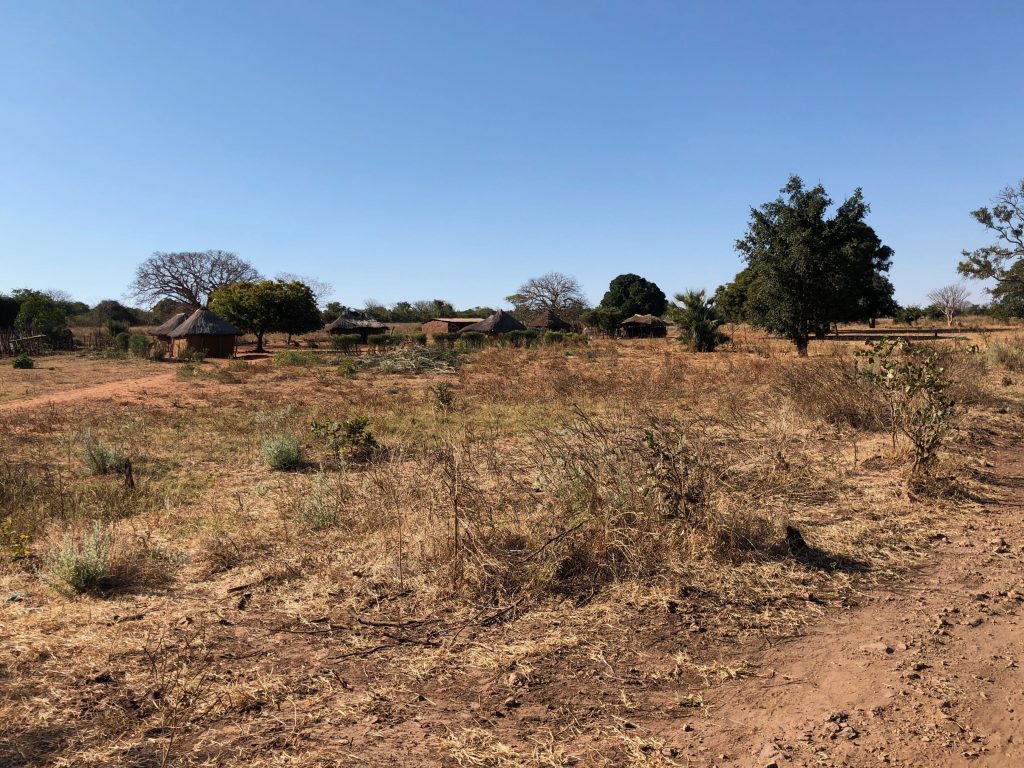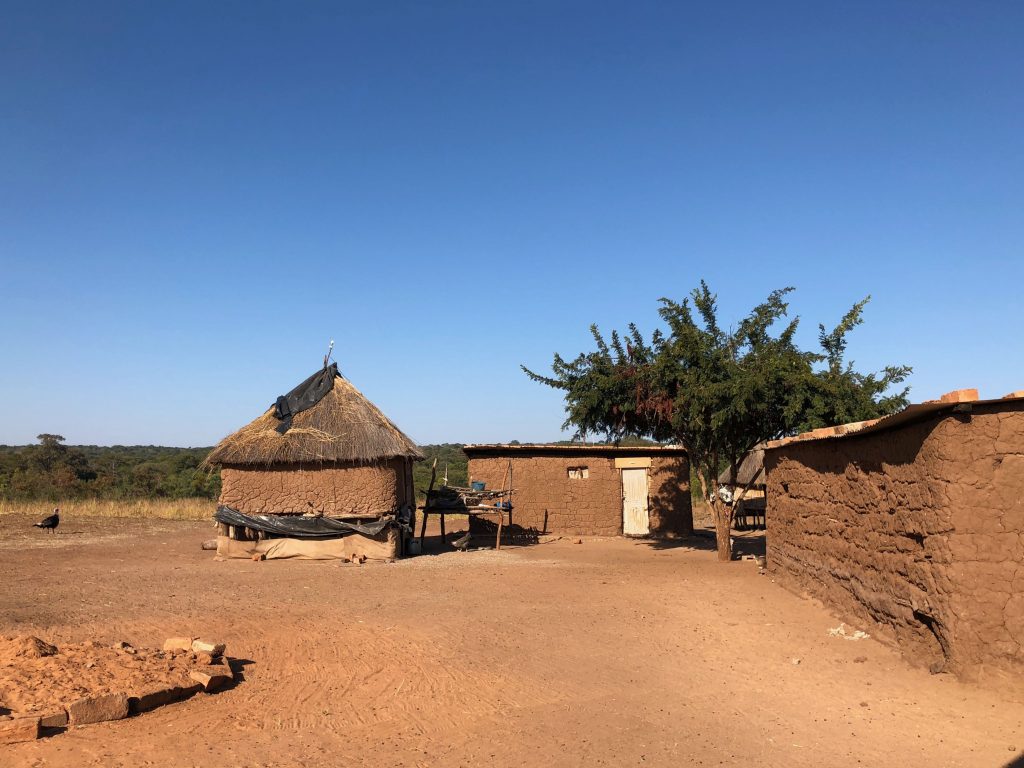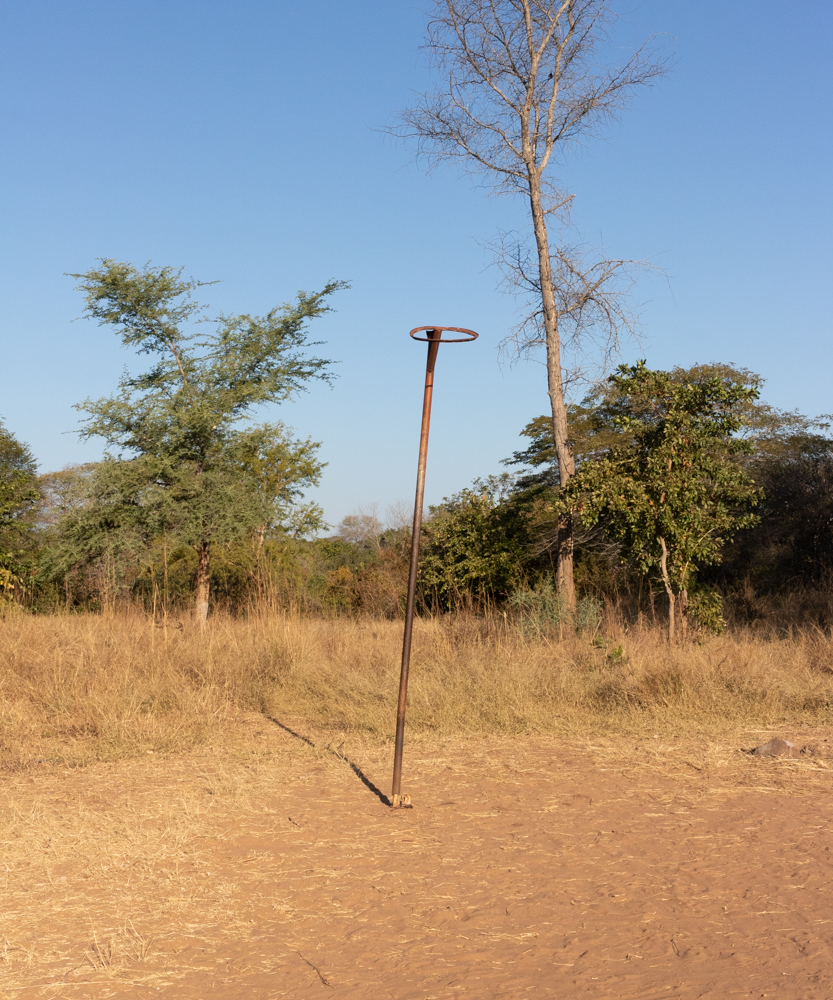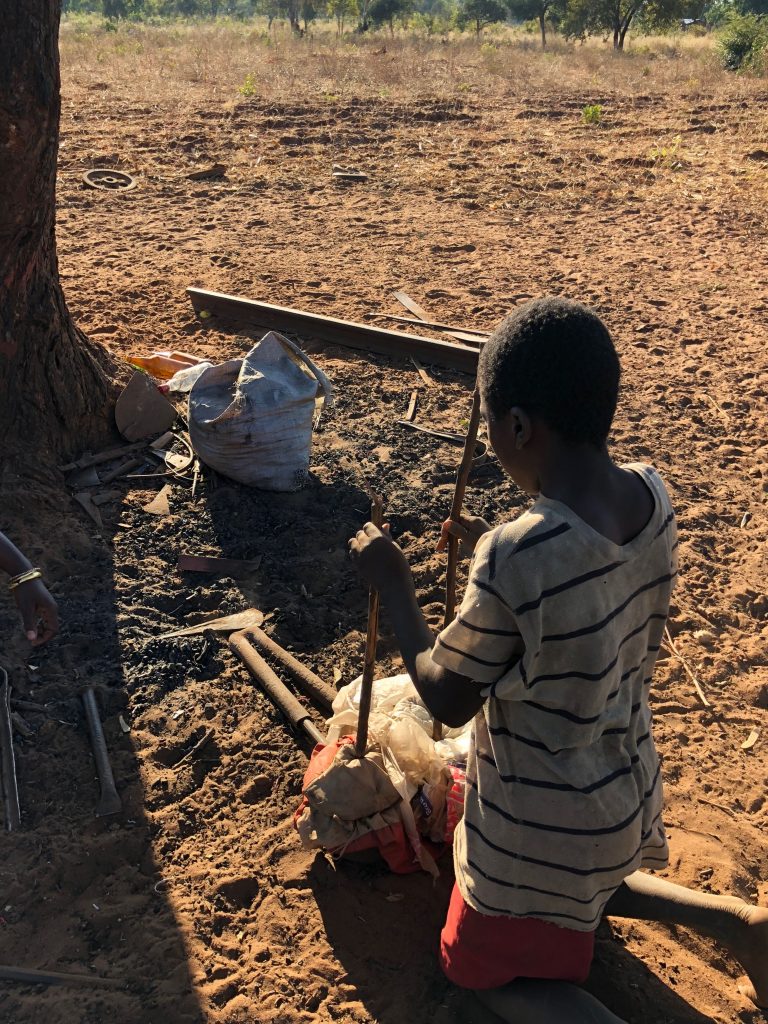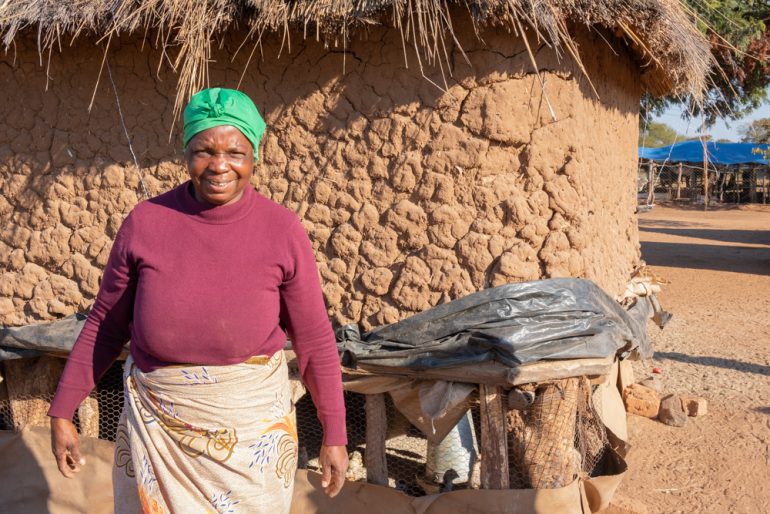from Livingston, Zambia.
We drive 7.5 miles up a bumpy dirt road to a village in Zambia that’s participating in a community development project. “This road turns into a river during the rainy season,” Quentino, our guide, says as we jostle through car-sized pot holes. That would make it impossible to get in or out of here by vehicle, I think. We pass thatched roof, mud-walled huts that look like they sprang up from the surrounding red-brown soil and shrubbery.
In what we’re told is the center of this village called Maunga is a tattered elementary school for some 300 kids. There’s no public education in Zambia, we learn—no one goes to school for free. Although it’s sometimes as little as $15 per year, Quentino tells us that some families can’t afford that. That’s not hard to imagine as I can see that many of these families are growing only enough food to feed themselves—there’s no way they could pay $15 per year.
There are no medical services in this village. If someone gets sick, they walk the 7.5 miles back to the main road. Orion, my son, is trying to understand this. “What if an axe cuts open their leg?,” he asks. “Then they walk, or someone carries them,” I tell him.
“What about malaria?,” Orion asks. “How do they prevent it?” We’re taking medication every night to prevent malaria. I explain that they might sleep under mosquito nets and probably take care when there are mosquitoes around, but that many people in the developing world get it. I tell him there’s medication to treat it, if they get to a doctor. Orion goes silent, staring out the window.
We arrive at the compound of the village headman. We’ve been joined on this outing by Twaambo Siyomunji who works in the community development project. Twaambo turns to me with a big grin on her face and says, “there is no name for what this person is because she’s the headman of the village, but she’s a lady. A lady headman. There is no name for that because it’s a new thing.” She seems delighted by this fact.
We are greeted by Beatrice, a stately woman who might be in her 50s or 60s. “Why are you the headman?,” I ask her, wondering about the process. “Because I am an honest person and the people chose me,” she responds.
“And for how long will you be the headman?,” I ask.
“Until I am tired,” she says. She explains that the last headman—a man—stepped down when he got tired. Beatrice settles disputes, counsels and advices her people, and facilitates decision-making about community issues. “Are there many lady-headmen?,” I ask. Beatrice laughs and shakes her head. I want to hear more, but she wants to show us her home.
She proudly takes us through her compound. There’s a small structure where she sleeps, another for her son and one for cooking, but the majority of the structures are for her livestock. She has pigs and chickens and cows and even a turkey. She proudly points out each animal, telling us what she feeds them and how she protects them from snakes and eagles. She shows us the well that took two months to dig, that provides water all the time. I try to explain to Orion that relatively, this woman is rich. He’s still focused on the poverty, on the farming implements that are of the iron age, on the barefooted children.
Orion’s conclusion that evening is that the trip to the village was depressing. It wasn’t just the poverty, he says, it was also hearing that a lot of government money for education doesn’t make it to schools. “Where does it go?,” he’d asked multiple times, not understanding our explanation of corruption and misuse of funds. “This just makes me more cynical,” he said.
I am realizing that my project to explore resilience in Southern Africa must include consideration of how to cultivate resilience in my own child.
How do I help him see the tragedy of poverty—and something else? The poverty is horrific—both what we’ve seen in the countryside and the urban poverty we saw in Cape Town, South Africa. All human beings deserve medical care, free education, food security, and a roof over their heads that keeps the rain off their bodies. And yet there’s more to the story than bare-footed children in tattered clothing.
First, poverty must be contextualized historically, economically and politically—because there’s no reason for this poverty in our modern world. In our family, we talk a lot about the history of the developing world, about European exploitation, about the gap between rich and poor today, and about human greed. Orion has two parents who’ve been history teachers and who see the world through a socio-political historical lens. (This book does a phenomenal job of explaining underdevelopment in the world).
Perhaps more important, I want Orion to see that these children are more than their poverty. I think of my Kenyan friend, Carol, who grew up in Kibera, an informal settlement in Nairobi, who grew up as poor as many of these people we’re seeing, and I think of where she is now—thriving as an education leader. I tell him about Carol, again, because he’s met her and he knows she’s alive and happy and has shoes. That makes him think. “But what about all the others?,” he asks. “Carol is just one person,” he continues, “and how many other kids that she grew up with are still there in the slums?” Yes, I think, what about all the others. Yes, Carol is one.
I see Orion’s empathy, deep and aching. And I don’t want to gloss over the poverty. But I also see happiness in the children as they run past our car shouting, “hello!” The air is clean here and there aren’t gangs or police killings or mass murders in movie theaters and teenagers aren’t dealing with anorexia and they eat locally grown food and grandmothers stand in the shade. I don’t want to romanticize poverty—but I also don’t want to see it exclusively through my economic frames of reference.
For now, I want to honor Orion’s sadness and not suggest he needs to change. We worry—my husband and I—about his cynicism, but we also know that there could be power in it. Where might it take him? The challenge is not to get stuck in it, but to develop an ability to hold perspective, and then to find one’s own agency and power to do something about it. We, educated Americans with all kinds of privilege, must use that privilege to create space for those who have less power. It is towards that—towards action and activism—that I lead my child. But first, some space for the feelings.
As he’s dozing off that night, he mumbles, “It was kind of cool that the headman was a woman.” He’s prone to making random comments. I leave it at that, simply responding, “yeah, it was cool,” recognizing that he sees this as change, possibly as hope.
